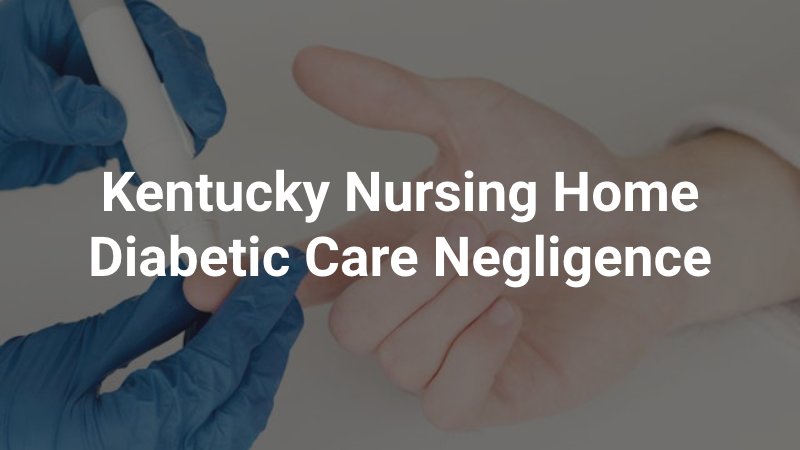Kentucky Nursing Home Diabetic Care Negligence

Kentucky nursing homes must have procedures in place to ensure high-quality care for their residents with diabetes. An estimated
18% of nursing home residents have diabetes and require a well-executed daily care plan. Diabetes in the elderly leads to a higher disability level, vascular problems, frequent infections, difficulty healing, and a higher morbidity level. This level of care can be challenging for nursing home caregivers, but nursing home administrators have the legal responsibility to provide skilled care with compassion and respect for human dignity, including to residents with special medical needs like diabetics. An adequate care plan is essential for the safety, health, and well-being of diabetic nursing home residents. When a nursing home neglects its duty of care and the lack of adequate care results in a resident’s worsened medical condition or death, the nursing home has financial accountability to the resident or their surviving family members.
What Responsibilities Does a Diabetes Care Plan Include in a Kentucky Nursing Home?
Diabetic care plans in nursing homes must be comprehensive, with a higher level of care than for non-diabetic residents. A care plan should include the following:
- Ongoing evaluations and treatment
- Daily glucose monitoring
- Administration of insulin and other diabetic medications as prescribed
- Careful adherence to a diabetic-appropriate diet to control glucose levels and weight
- Prompt wound care to promote healing and prevent infections
Failure to provide skilled medical care to a diabetic nursing home resident can result in a worsened medical condition such as increased risk of infections, medical amputations, diabetic coma, and death. Complications from diabetes can cause a decline in physical and cognitive health and lead to disability and death.
Causes of Nursing Home Neglect in Diabetic Residents
Nursing homes in the United States are chronically understaffed. The rising cost of labor and frequently unfavorable working conditions in nursing homes make it difficult for these facilities to attract and keep qualified staff members. Nursing homes have high employee turnover rates, sometimes resulting in poorly trained caregivers and overwhelmed, exhausted, and frustrated staff. An unrealistic caregiver-to-resident ratio makes it difficult or impossible for every resident to receive proper care. Because a diabetic resident requires more care than typical residents, they are more likely to experience dangerous gaps in their necessary care.
What Happens If Nursing Home Neglect Causes Harm or Death to a Diabetic Resident?
Diabetic residents in nursing homes require skilled care that goes beyond the basic care needs of most residents. Nursing home caregivers must deliver the diligent attention required to maintain the highest possible quality of life for the resident.
If nursing home caregivers neglect their duty of care to a diabetic resident and the result is a worsened medical condition or death, the nursing home administration is accountable for the death and liable for damages to the victim or their surviving family members through a nursing home abuse claim for diabetic care negligence.
How Can a Nursing Home Abuse Lawyer Help My Case?
Nursing homes are liable for damages to a victim like medical expenses, funeral expenses, lost income for family members, and compensation for pain and suffering. Proving a nursing home neglect case in Kentucky requires substantial evidence to make a compelling case for the maximum compensation. For suspected abuse or neglect cases, first, report the abuse to the nursing home administrators, local law enforcement, and the Kentucky Office of Inspector General and Cabinet for Health and Family Services. Then, call the
Louisville nursing home abuse lawyers at Gray & White Law for a confidential case evaluation so we can take action on your family’s behalf and recover compensation, financial accountability, and a sense of justice.
 Kentucky nursing homes must have procedures in place to ensure high-quality care for their residents with diabetes. An estimated 18% of nursing home residents have diabetes and require a well-executed daily care plan. Diabetes in the elderly leads to a higher disability level, vascular problems, frequent infections, difficulty healing, and a higher morbidity level. This level of care can be challenging for nursing home caregivers, but nursing home administrators have the legal responsibility to provide skilled care with compassion and respect for human dignity, including to residents with special medical needs like diabetics. An adequate care plan is essential for the safety, health, and well-being of diabetic nursing home residents. When a nursing home neglects its duty of care and the lack of adequate care results in a resident’s worsened medical condition or death, the nursing home has financial accountability to the resident or their surviving family members.
Kentucky nursing homes must have procedures in place to ensure high-quality care for their residents with diabetes. An estimated 18% of nursing home residents have diabetes and require a well-executed daily care plan. Diabetes in the elderly leads to a higher disability level, vascular problems, frequent infections, difficulty healing, and a higher morbidity level. This level of care can be challenging for nursing home caregivers, but nursing home administrators have the legal responsibility to provide skilled care with compassion and respect for human dignity, including to residents with special medical needs like diabetics. An adequate care plan is essential for the safety, health, and well-being of diabetic nursing home residents. When a nursing home neglects its duty of care and the lack of adequate care results in a resident’s worsened medical condition or death, the nursing home has financial accountability to the resident or their surviving family members.